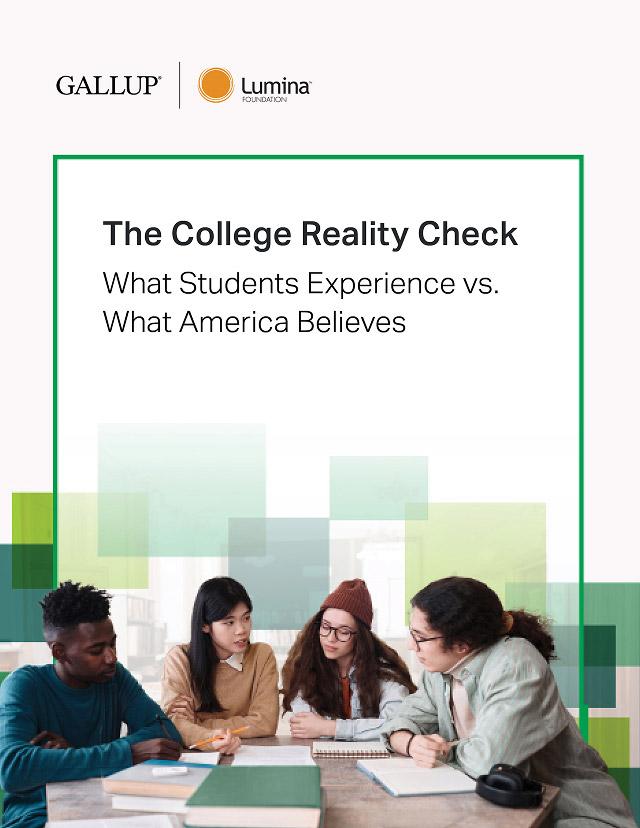![Lumina > Research Hub > Top Card > The College Reality Check Report > 2026-02 [UPDATE]](https://imagekit.gallup.com/fusion/tr:n-emd_tmpl_dlp_bg_lg/ANALYTICSV9CMS/rnl3ntrrfkguzqnov9obtg.jpg)
Lumina Foundation
Gallup and Lumina Foundation are committed to studying the most pressing issues facing higher education.
The College Reality Check
While public confidence in higher education has declined sharply in recent years, current students and graduates report far more optimistic experiences. The College Reality Check: What Students Experience vs. What America Believes report from Lumina Foundation and Gallup examines this divide, highlighting public skepticism alongside the positive outcomes described by those on campus and beyond.
Although significant partisan gaps in confidence persist among adults, such differences are not observed among students themselves. Three-quarters of graduates say their degree was important to their career success, and most recent bachelor’s degree graduates secured a good job within a year of graduation. Cost remains a top concern, yet the majority of students and alumni continue to view a college degree as worth the investment.
Read the full report for more findings and insights.
24% vs. 93% 24% of Americans with low confidence in higher education cite the cost and expenses as a concern, vs. 93% of bachelor's degree students who say their college investment is worthwhile
32% vs. 88% 32% of Americans with low confidence in higher education cite lack of career readiness as a reason for their skepticism, vs. 88% of students who are confident their degree will help them secure a job
38% vs. 70% 38% of Americans with low confidence in higher education cite campus politicization as a concern, vs. 70% of college students agree they can express their opinions freely on campus
Lumina Foundation in the Media
Download Past Gallup-Lumina Foundation Reports
-
The State of Higher Education 2025
-
Beyond the Headlines: The Reality of Free Speech on College Campuses
-
Bridging the Gap: Insights on Cost and Value of a College Degree
-
The State of Higher Education 2024 Report
-
Cost of College: The Price Tag of Higher Education and Its Effect on Enrollment
-
Policies and Laws: How They're Impacting College Enrollment
-
Education for What?
-
The State of Higher Education 2023 Report
-
Stressed Out and Stopping Out: The Mental Health Crisis in Higher Education
-
Balancing Act: The Tradeoffs and Challenges Facing Black Students in Higher Education
-
The State of Higher Education 2022 Report
-
Gallup State of the Student Experience 2020 Report
-
Some College and No Degree
-
Americans Attitudes Towards Postsecondary Education
-
Great Jobs Great Lives Purdue Index Report
-
Americans Call for Higher Education Redesign
Subscribe to Our Research
Sign up to receive email updates about our latest global analytics work, including insights from our survey research and polling around the world.









